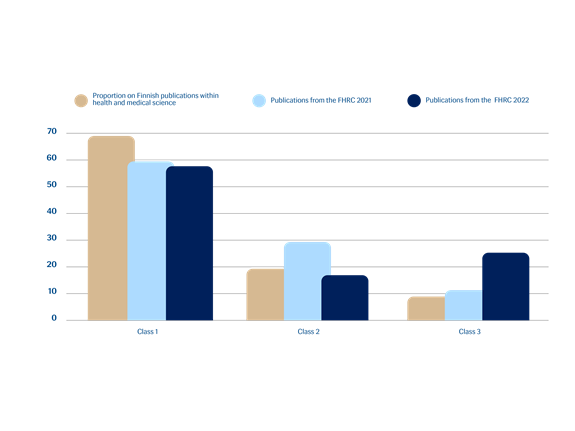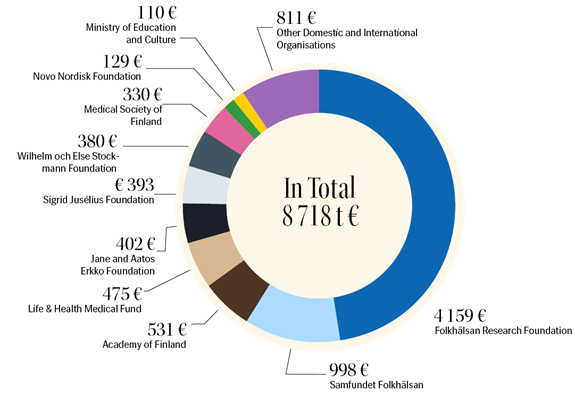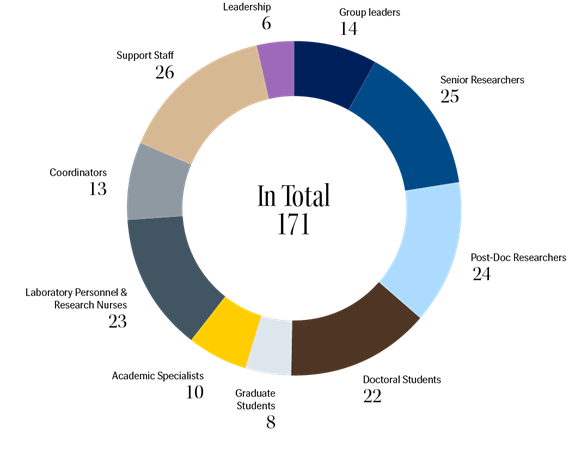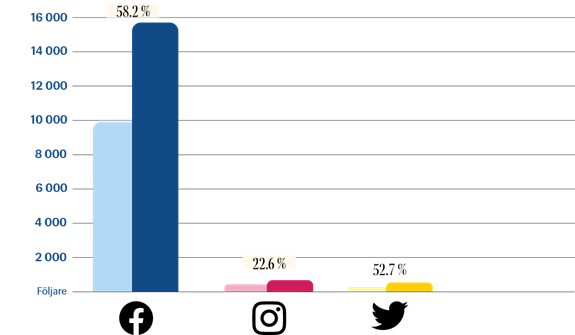Overview of 2022
The directors summary of 2022 as well as some key statistics of the year provide an overview of our activities during 2022.

Overview of 2022
2022 was an important milestone for the Research Center, as it marked a long history of genetics research at Folkhälsan. The Folkhälsan Institute of Genetics – founded on July 1st 1962 – functioned as a separate institute within the Samfundet Folkhälsan [the Folkhälsan Foundation] until 2006 when it was incorporated into the Folkhälsan Research Center as the Genetics Research Program. The 60th anniversary of genetics research was celebrated in June with a scientific symposium where seven distinguished speakers presented topics reflecting the past and present high-quality research at Folkhälsan.
To honor the life work of Professor Albert de la Chapelle (1933–2020) – who led the genetics research at Folkhälsan from 1962 to 2004 – the Samfundet Folkhälsan decided in December 2021 to launch a prize bearing the name “Samfundet Folkhälsan Albert de la Chapelle Prize in Medical Genetics”. The prize of 20 000 euro would be awarded to a young scientist, based in one of the Nordic countries, who has made exceptional contributions in the field of medical genetics. Professor Kajsa Paulson from the Lund University was announced as the first recipient of the prize in the symposium where she gave a talk entitled “Understanding Hyperdiploidy: Clonal Evolution and Role of Chromosomal Gains in Acute Leukemia” (link to symposium article).
Productive operations at the Research Center continued under the leadership of four newly appointed and 12 previously established Group Leaders. Six Doctoral Students from the Genetics Research Program and one from the Public Health Research Program defended their doctoral theses at the University of Helsinki. Twelve master's theses and one thesis within advanced studies in the degree program in medicine were completed at the Research Center during the year. The Research Groups published 250 articles, of which 223 were original publications in scientific journals. The distribution of the articles in the three classes defined by the Publication Forum demonstrates the high quality of the scientific production. Some highlights of the publications – reflecting the diversity of the research – are summarized in this annual report.
About 10% of all the scientific articles from the Center were also published as popular science articles on the web or in “Tidningen Folkhälsan” [Folkhälsan magazine]. The Research Center's visibility increased with video materials and graphics in all active social media channels as measured by followers and engagement.
The year 2022 was exceptional as well regarding the number of new Docents as five scientists in the Genetics Research Program were granted the title of Docent by the University of Helsinki. Four scientists were also awarded for their scientific achievements.
The year culminated on December 9th in the celebration of the 25th anniversary of the Finnish Diabetic Nephropathy (FinnDiane) Study Group with a scientific symposium. This was a great opportunity to reflect how a deeper understanding of diabetic complications has led to better outcome of this disease, current research and future possibilities in treatment. Since November 1997 more than 9000 individuals with type 1 diabetes have joined the FinnDiane study which has produced 350 publications and 25 doctoral theses.
Publications
In 2022, the research groups published 250 articles, of which 223 were original publications in scientific journals. Six doctoral students from the Genetics Research Programme and one from the Public Health Research Programme defended their doctoral theses at the University of Helsinki. Twelve master's theses and one in-depth study in medicine were also completed at the research center during the year. Some highlights of our publications – reflecting the diversity of our research – are summarized in this annual report (link to all publications).
The JUFO publication forum is a tiering of publication channels implemented by the Finnish scientific community as a tool for quality assessment of research. Folkhälsans research is positively overrepresented in the highest category.

Funding
Despite the circumstances of inflation and global instability, the groups were successful in obtaining external funding for their research. Total funding for 2022 was EUR 8.72 M. External funding accounted for 41%, with 48% coming from the Folkhälsan Research Foundation and 11% from the Samfundet Folkhälsan Foundation.

Personnel
In 2022, the research center had 83 full-time, 53 part-time and 35 hourly employees, representing around 130 work-years. Two doctoral students conducted research entirely on a grant basis. In addition, several doctoral students and other researchers belonged to groups whose funding was entirely external.

Visibility
The research center has invested in its external visibility also outside the scientific sphere. This is done through popular science articles on our research and popularization of our research in different formats such as video and on social media.
Visibility is measured through key metrics such as number of social media followers, social media engagement, number of readers of our web articles, reader response and media visibility. In 2022, visibility and engagement increased remarkably across all channels.

Awards
-
Hannes Lohi was invited to the Finnish Academy of Sciences and Letters 2022.
-
Outi Mäkitie was awarded the Charles Slemenda Award for research excellence in the field of pediatric bone diseases. The award was presented by the ICCBH Steering Group Chair Frank Rauch. 2.7.2022, Dublin, Ireland.
-
Joni Turunen was awarded the Elsemay Björn Foundation’s “Young investigator award 2022”.
-
Nicolae Panduru University of Helsinki's 2021 dissertation prize for a particularly meritorious dissertation. 5.5.2022.
Appointments
-
Hannes Lohi was appointed as a HiLIFE Fellow 2023-2025.
-
Kirsi Kiiski, Docent in diagnostic genetics, The Faculty of Biological and Environmental Sciences, University of Helsinki. 29.11.2022.
-
Saila Laakso, Docent experimental pediatrics. Faculty of Medicine, University of Helsinki. 30.5.2022.
-
Vilma-Lotta Lehtokari, Docent in medical genetics. Faculty of Medicine, University of Helsinki.19.12.2022.
-
Riikka Mäkitie, Docent in medical genetics. Faculty of Medicine, University of Helsinki. 8.9.2022.
-
Marco Savarese, Docent in medical molecular genetics. Faculty of Medicine, University of Helsinki. 30.5.2022.
